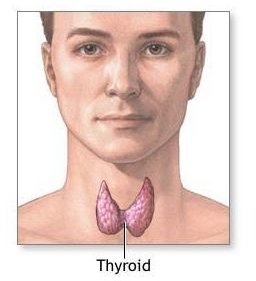Organic Herbs for Thyroid Disease: Natural Treatment for Hyper & Hypothyroidism
Thyroid Disease
The thyroid gland, small and shaped like a butterfly, is located in the lower part of the neck. Its primary responsibility is to produce thyroid hormones (T3 and T4) which regulate the body’s metabolism. When it produces too many hormones, the condition is called hyperthyroidism and when it produces too little, the condition is called hypothyroidism.
Thyroid disease can affect people of all ages and races; however, women (especially older women) are at a higher risk of developing both hyper- and hypothyroidism.
Thyroid Disease Symptoms
Symptoms of hyperthyroidism include:
- increased appetite and progressive weight loss (because of an increased metabolic rate)
- bulging eyes
- nervousness
- irritability
- rapid pulse (at rest as well as on exertion)
- low heat tolerance
- profuse sweating
- flushed skin
- muscle fatigability and weakness
- fine tremor of hands
- change in bowel habits (constipation or diarrhea).
Symptoms of hypothyroidism include:
- weight gain or difficulty losing weight (because of a decreased metabolic rate)
- mask-like facial expression
- fatigue and lethargy
- muscle aches or weakness
- depression
- clumsiness
- forgetfulness
- constipation
- dry, thick skin
- thin hair that falls out easily
- hoarse voice
- slow heart rate
- low body temperature (complains of cold hands and feet)
- intolerance to cold
- menorrhagia or amenorrhea (may have difficulty conceiving or experiences spontaneous abortion).
Natural Treatment
The following organic herbs for thyroid disease (or non-organic herbs; however, organic is preferred) can be helpful in the treatment of hyper- or hypothyroidism:
Bugleweed (Lycopus virginicus)
Bugleweed belongs in the mint family (Lamiaceae) and is known as the “odorless mint”. It has been shown to decrease thyroid hormone levels in both animals and humans and is widely used in Europe to treat early-stage hyperthyroidism. Bugleweed also prevents antibodies from attaching to and “burning out” cells in the thyroid gland.
Lemon Balm (Melissa officinalis)
Lemon balm also belongs in the mint family but has a lemony scent. Extracts have been shown to reduce thyroid hormone levels and is commonly combined with bugleweed to treat mild cases of hyperthyroidism.
Gentian (Gentiana officinalis)
According to Daniel Mowrey, Ph.D. (herbal pharmacologist), gentian “provides bitter principles known to normalize the functioning of the thyroid.” It is normally combined with other natural ingredients (such as cayenne and kelp) to treat hypothyroidism.
Kelp (Fucus vesiculosis)
Kelp is one of nature’s richest source of iodine. Iodine is essential in the production of thyroid hormones, making it helpful in the treatment of hypothyroidism. Using a natural source of iodine is better than using a chemical iodine (it is absorbed more slowly).
Before taking non-organic or organic herbs for thyroid disease, it is important that you consult with your health care provider first.
Sources Used
The Lippincott Manual of Nursing Practice, 4th Edition (1986)
RestorativeMedicine.com “Hyperthyroidism” https://www.restorativemedicine.com/pages/hyperthyroidism.html/
MotherNature.com “Hypothyroidism” https://www.mothernature.com/Library/Bookshelf/Books/41/69.cfm
Photo Credit
Image courtesy of the National Library of Medicine (NLM).
Disclaimer
Please read this disclaimer regarding the information contained within this article.
